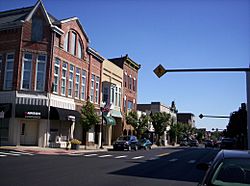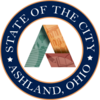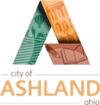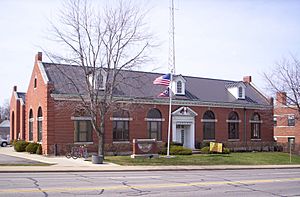Ashland, Ohio facts for kids
Quick facts for kids
Ashland, Ohio
|
|||||
|---|---|---|---|---|---|

East Main Street, downtown
|
|||||
|
|||||
| Motto(s):
"Someplace Special"
|
|||||

Location of Ashland in Ashland County
|
|||||
| Country | United States | ||||
| State | Ohio | ||||
| County | Ashland | ||||
| Area | |||||
| • Total | 11.35 sq mi (29.39 km2) | ||||
| • Land | 11.28 sq mi (29.22 km2) | ||||
| • Water | 0.06 sq mi (0.16 km2) | ||||
| Elevation | 1,066 ft (325 m) | ||||
| Population
(2020)
|
|||||
| • Total | 19,225 | ||||
| • Estimate
(2023)
|
18,718 | ||||
| • Density | 1,703.74/sq mi (657.84/km2) | ||||
| Time zone | UTC-5 (Eastern (EST)) | ||||
| • Summer (DST) | UTC-4 (EDT) | ||||
| ZIP code |
44805
|
||||
| Area codes | 419, 567 | ||||
| FIPS code | 39-02568 | ||||
| GNIS feature ID | 1085702 | ||||
Ashland is a city in and the county seat of Ashland County, Ohio, United States, about 66 miles (106 km) southwest of Cleveland and 82 miles (132 km) northeast of Columbus. The population was 19,225 at the 2020 census. It is the center of the Ashland Micropolitan statistical area, which includes all of Ashland County.
History
Ashland was laid out by Daniel Carter in 1815. Ashland was originally called Uniontown, but in 1822 the city was compelled to adopt a new name because another city in Ohio was already named Uniontown. The new name of Ashland was selected by supporters of the Kentucky congressman Henry Clay, from Ashland, his estate near Lexington. Later, "Henry Clay High School" was considered as a name for what is now known as Ashland High School.
In the mid-1800s, Ashland pioneers traveled to Oregon, naming a settlement after the town. In 1878, with financial assistance from the city, the German Baptist Brethren Church opened Ashland College. Ashland became an early center of manufacturing in Ohio. In 1870, brothers Francis E. Myers and Philip A. Myers went into business selling farm equipment and operating a repair shop. They secured the patent for a double-action pump that delivered water in a steady stream rather than spurts. By 1915, F.E. Myers & Bro. had 800 workers. Myers was the largest of the 47 factories in Ashland at that time. Other factories included Reliable Match Co. ("Strike Anywhere Matches"), Kauffman Mfg. Co. (manufacturer of folding chairs used in Union Army encampments), Dr. Hess & Clark (veterinary supplies and disinfectants) and T.W. Miller's Faultless Rubber Co. (rubber sundries, surgical goods and bicycle tires).
In 1912, Harry Ross Gill, an Ashland native, invented the way to make cigar-shaped balloons (until then they were only round). He started the Eagle Rubber Company in 1913 and the National Latex company in 1929. The industry that Gill developed in Ashland led to the city becoming known as "the balloon capital of the world." Ashland still celebrates its balloon heritage with its annual BalloonFest.
Ashland was designated a Tree City USA by the National Arbor Day Foundation in 1984.
Geography
According to the 2010 census, the city has an area of 11.23 square miles (29.1 km2), of which 11.17 square miles (28.9 km2) (or 99.47%) is land and 0.06 square miles (0.16 km2) (or 0.53%) is water.
The city has 85.6 miles (137.8 km) of streets, one hospital, two fire stations, one police station, and five parks.
Demographics
| Historical population | |||
|---|---|---|---|
| Census | Pop. | %± | |
| 1850 | 1,264 | — | |
| 1860 | 1,748 | 38.3% | |
| 1870 | 2,601 | 48.8% | |
| 1880 | 3,004 | 15.5% | |
| 1890 | 3,568 | 18.8% | |
| 1900 | 4,087 | 14.5% | |
| 1910 | 6,795 | 66.3% | |
| 1920 | 9,249 | 36.1% | |
| 1930 | 11,141 | 20.5% | |
| 1940 | 12,453 | 11.8% | |
| 1950 | 14,287 | 14.7% | |
| 1960 | 17,419 | 21.9% | |
| 1970 | 19,872 | 14.1% | |
| 1980 | 20,252 | 1.9% | |
| 1990 | 20,079 | −0.9% | |
| 2000 | 21,249 | 5.8% | |
| 2010 | 20,362 | −4.2% | |
| 2020 | 19,225 | −5.6% | |
| 2023 (est.) | 18,718 | −8.1% | |
| U.S. Decennial Census | |||
2010 census
As of the census of 2010, the city had 20,362 people, 8,063 households, and 4,813 families. The population density was 1,822.9 inhabitants per square mile (703.8/km2). There were 8,914 housing units at an average density of 798.0 units per square mile (308.1 units/km2). The city's racial makeup was 95.8% White, 1.4% African American, 0.1% Native American, 1.0% Asian, 0.1% Pacific Islander, 0.3% from other races, and 1.3% from two or more races. Hispanic or Latino of any race were 1.2% of the population.
There were 8,063 households, of which 28.2% had children under the age of 18 living with them, 43.2% were married couples living together, 12.1% had a female householder with no husband present, 4.4% had a male householder with no wife present, and 40.3% were non-families. 34.2% of all households were made up of individuals, and 15.9% had someone living alone who was 65 years of age or older. The average household size was 2.28 and the average family size was 2.91.
The city's median age was 36.1 years. 21% of the city's population was under age 18; 15.7% was from age 18 to 24; 22.5% was from age 25 to 44; 23.1% was from age 45 to 64; and 17.7% was age 65 or older. The city's gender makeup was 46.8% male and 53.2% female.
Education
The Ashland City School District enrolls 3,192 students in public primary and secondary schools as of the 2017–18 school year.3904350 The district operates five schools, including three elementary schools, one middle school, one high school. The Ashland City School District superintendent is Steve Paramore. The city is also home to Ashland Christian School, St. Edward Catholic School, and Ashland Montessori School.
The city is home to Ashland University and Ashland Theological Seminary. Both were established by the Brethren Church—an Evangelical Protestant church in the Anabaptist tradition—which is headquartered in Ashland.
Ashland contains the Ashland Public Library. The Ashland Public Library provides free access to computers and wifi, reservable meeting rooms, materials, Golden Buckeye Card applications, tech coaching, voter registration, and library events. All programs held at the library are entirely free for patrons. The APL has three library vehicles; two act as bookmobiles for the community. Obtaining a library card is free and the library is now a fine free establishment.
Notable people
- William B. Allison, politician who represented Iowa in the U.S. House of Representatives and U.S. Senate
- Rolla Kent Beattie, botanist
- Jessica Canseco, ex-wife of former baseball player José Canseco
- Ernest Cline, screenwriter
- Mary Hannah Fulton, medical missionary in China
- Morris E. Gallup (1825–1893), member of the Ohio House of Representatives
- Frank John William Goldsmith, survivor of the sinking of the Titanic
- Joseph F. Holson, toxicologist and President of WIL Research Laboratories
- James P. Latta, U.S. Representative from Nebraska
- Ronnie Martin, musician
- Fred Martinelli, college football head coach, member of College Football Hall of Fame
- Clara Worst Miller, Ashland College professor of Latin and writer
- Joseph D. Moody, president of the Historical Society of Southern California
- Eric Musselman, college and professional basketball team coach
- Thomas F. Olin, Chairman of Archway Cookies, Incorporated. (Named Ashland, Ohio's first "Citizen of the Year" in 1991)
- Tim Richmond, NASCAR driver, Indianapolis 500 Rookie of the year
- John Roseboro, professional baseball player in Major League Baseball
- Edmund G. Ross, U.S. Senator for Kansas and Governor of the New Mexico Territory
- Tim Seder, professional football player in the National Football League (NFL)
- Jonathan Shafer, racing driver
- Todd Shafer, racing driver
- Robert C. Springer, astronaut
- Alfred P. Swineford, Member of the Michigan House of Representatives from 1871 to 1872
- Matt Underwood, TV play-by-play announcer for the Cleveland Guardians
- Ron Zook, college football head coach; assistant coach in the NFL
See also
 In Spanish: Ashland (Ohio) para niños
In Spanish: Ashland (Ohio) para niños







